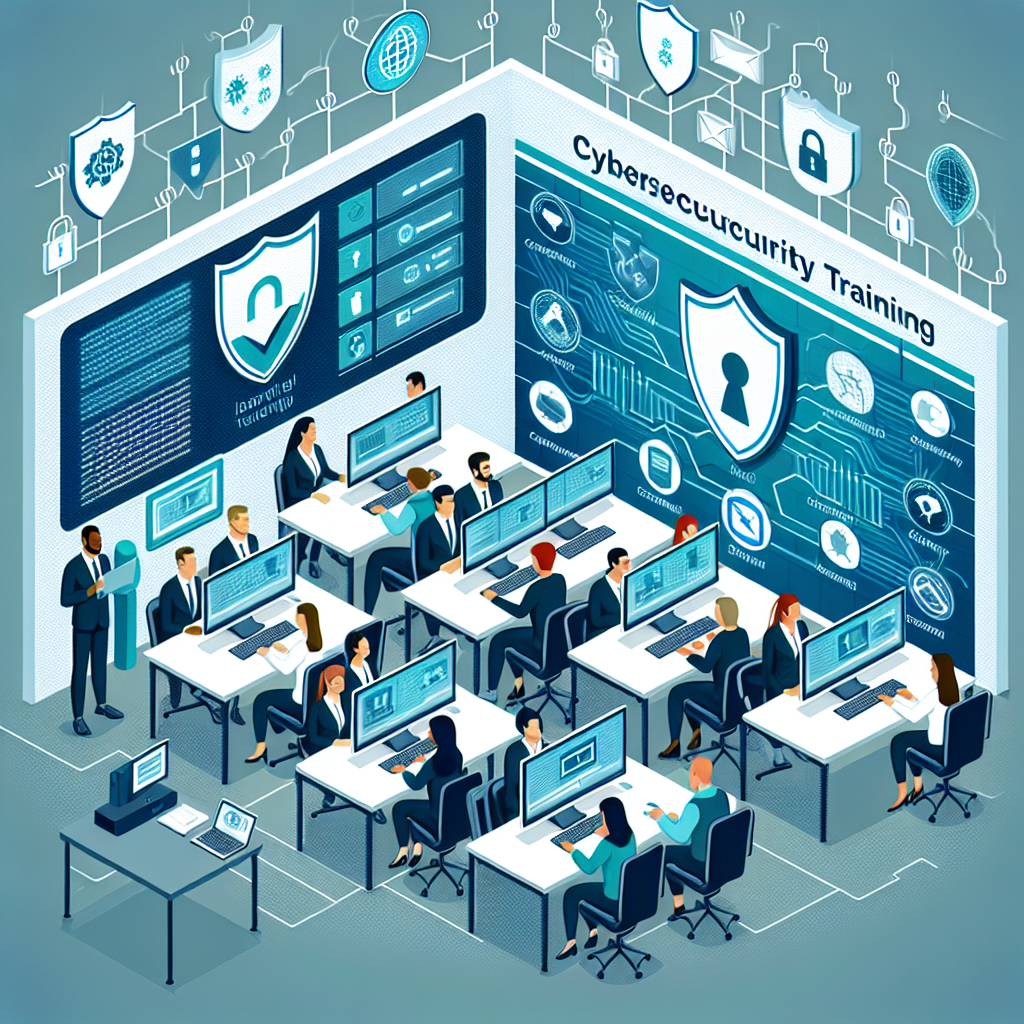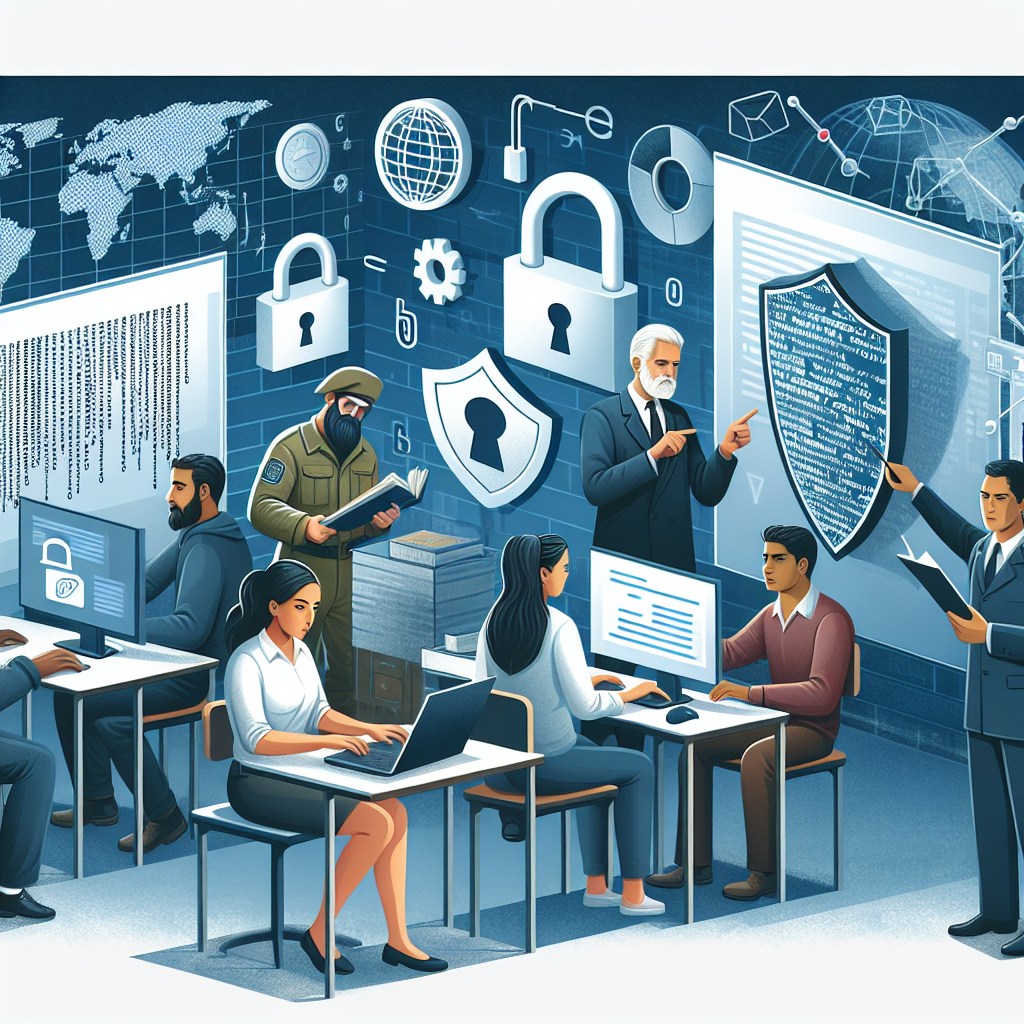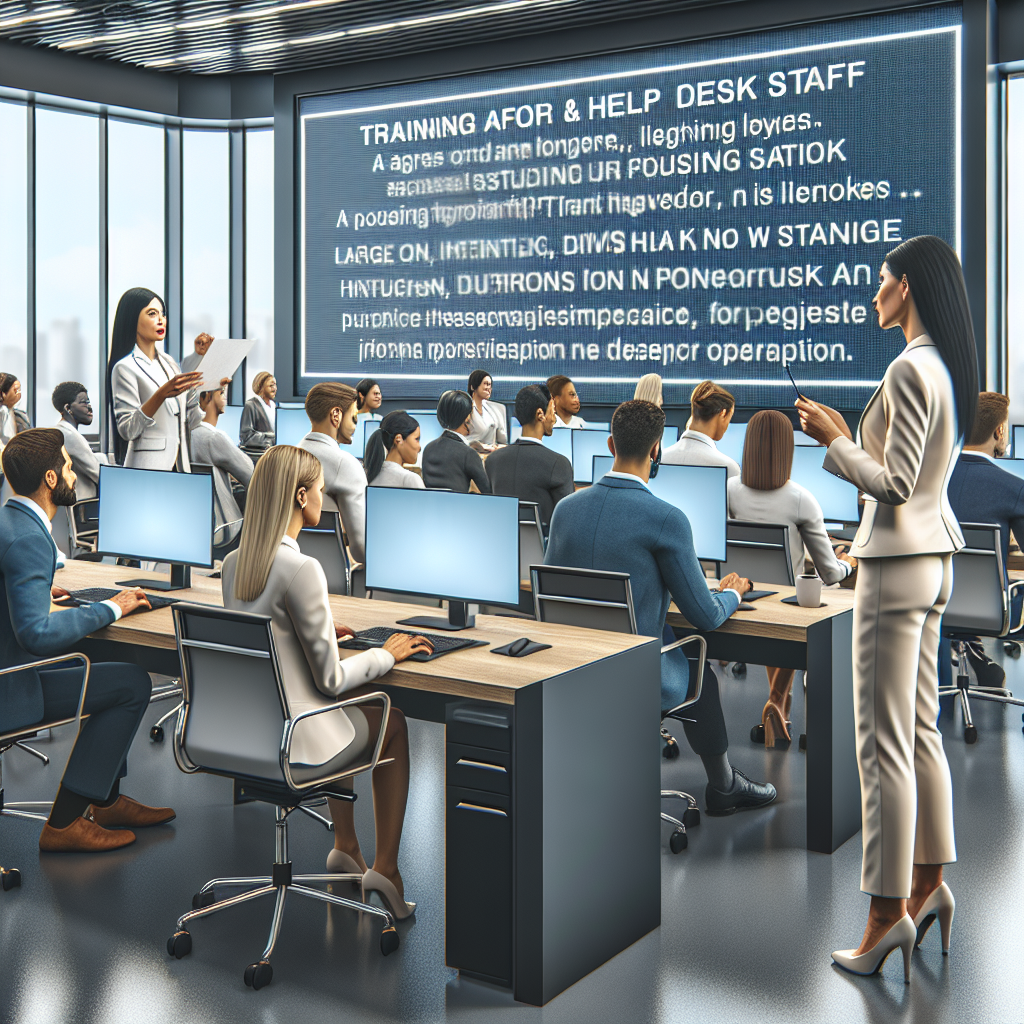Your cart is currently empty!
Tag: Training

The Benefits of Disaster Recovery Testing and Training
Disasters can strike at any time, and it is essential for businesses to be prepared. One of the most critical aspects of disaster preparedness is conducting regular testing and training for disaster recovery plans. By regularly testing and training employees on disaster recovery procedures, businesses can ensure that they are able to quickly and effectively respond to any disaster that may occur.There are numerous benefits to conducting disaster recovery testing and training. Some of the most significant benefits include:
1. Identifying weaknesses in the disaster recovery plan: Regular testing and training allow businesses to identify any weaknesses in their disaster recovery plan. By uncovering these weaknesses, businesses can make necessary adjustments to improve their ability to recover from a disaster quickly and efficiently.
2. Ensuring employees are prepared: By regularly training employees on disaster recovery procedures, businesses can ensure that all employees are aware of their roles and responsibilities in the event of a disaster. This can help to prevent confusion and chaos during a disaster, allowing employees to respond effectively and efficiently.
3. Improving response times: Regular testing can help businesses to identify ways to improve their response times in the event of a disaster. By practicing disaster recovery procedures, employees can become more familiar with the steps they need to take, helping them to respond quickly and effectively when a disaster occurs.
4. Minimizing downtime: By having a well-tested and trained disaster recovery plan in place, businesses can minimize downtime in the event of a disaster. This can help to reduce the impact of a disaster on the business, allowing operations to resume more quickly and minimizing financial losses.
5. Enhancing business continuity: By conducting regular disaster recovery testing and training, businesses can enhance their overall business continuity efforts. A well-prepared and trained workforce can help to ensure that the business can continue to operate even in the face of a disaster, helping to protect the business’s reputation and customer relationships.
In conclusion, disaster recovery testing and training are essential components of any business’s disaster preparedness efforts. By regularly testing and training employees on disaster recovery procedures, businesses can identify weaknesses in their plans, ensure employees are prepared, improve response times, minimize downtime, and enhance business continuity. Investing in disaster recovery testing and training can help businesses to be better prepared for any disaster that may occur, ultimately helping to protect the business and its stakeholders.
Daniil Medvedev pinpoints one area of his game he’s been working to improve in training since shock Australian Open defeat
Daniil Medvedev will be eager to put all of his focus on the Rotterdam Open, but part of him may still be thinking about his disastrous Australian Open.
Medvedev is among the biggest Australian Open losers, having fallen in the second round to American youngster Learner Tien.
And in his first round meeting with Kasidit Samrej, Medvedev was booed by the Australian Open crowd, summarising his disappointing experience in Melbourne.
Medvedev was the fifth seed at the Australian Open, where he is a three-time finalist, having lost last year’s final to Jannik Sinner.
He now moves on from that early exit by taking on Stan Wawrinka at the Rotterdam Open, where Sinner is taking a rest from his recent Grand Slam success.

Photo by Andy Cheung/Getty Images Daniil Medvedev wants to improve confidence after shock Australian Open loss
Medvedev is the second seed in Rotterdam, with the Russian sharing what he has been working on ahead of the event with the ATP Tour website.
“It was a tough result in Australia,” he said. “In a way, it was a good match, but a tough result. I am just trying to look forward and bounce back, that is the only way. I have to try to gain some confidence to win some matches.
“I am trying to get my game more competitive. It is not easy but I am working on a lot of things but I think my confidence is the most important.
“Confidence and the work you put in show in the most important moments of matches, and you try and put the reps in to have that belief in your body.
“I am working on lots of areas. Let’s take volleys. I am not the best at the net on tour but I am capable sometimes of making some amazing volleys in important moments.
“One against Learner in Australia. You work every day on aspects of your game and sometimes they work in matches and sometimes not.
“I feel I am in a good position. I had a very good pre-season and a great week before the Australian Open. I remain calm.
“I am confident I can find my level and play my best in Rotterdam. When you have an amazing week and results and then you lose the next tournament early, you feel your good result is forgotten. That is tennis.
“It works both ways, when you have a bad result people focus on that until you play well again. I hope I can play well here this week at an event I have had success at.”
Daniil Medvedev excited for new generation after Australian Open loss to Learner Tien
Tien was among the rising stars to really shine at the Australian Open, with his fellow NextGen player Joao Fonseca also picking up a top 10 win against Andrey Rublev.
A total of five of the eight players from the 20-and-under tournament in Jeddah in December reached at least the second round in Melbourne, with Tien joined by fellow American Alex Michelsen in making it to round four.
Sharing his thoughts on that new group of ATP players, Medvedev noted: “I think it is normal to have a new generation coming. I think every generation probably had this. Young guys coming and beating top 10 players at majors.
“Learner played a great match and was able to win the next one even when we finished at three in the morning. So that showed he was ready for it and a good sign.
Daniil Medvedev Grand Slam finals “But with this new generation, there are a lot of good young guys. Some generations have more players coming through like this than others, but there are always great players coming.
“Let’s see what they are able to do over the coming period, that is tough. But for sure they have a very strong generation.”
Related Topics
After his surprising early exit at the Australian Open, Daniil Medvedev has been hard at work in training to improve one specific area of his game. The Russian tennis star recently revealed that he has been focusing on his mental toughness and staying calm under pressure.In a recent interview, Medvedev admitted that he struggled to maintain his composure during his match at the Australian Open, which ultimately led to his defeat. He acknowledged that he needs to work on controlling his emotions and staying focused, especially in crucial moments.
“I know that I have the skills and the talent to compete at the highest level, but I need to work on my mental game to ensure that I can perform at my best when it matters most,” Medvedev said.
The 25-year-old has been working closely with his coaches to develop strategies to improve his mental strength and resilience on the court. He has been practicing mindfulness techniques and visualization exercises to help him stay calm and composed during matches.
“I have been putting in the hard work in training to make sure that I can handle the pressure and stay focused on my game,” Medvedev added.
With his sights set on future tournaments, including the upcoming French Open, Medvedev is determined to bounce back stronger than ever. By pinpointing and addressing this key area of improvement, he is confident that he can elevate his game to new heights and compete with the best in the world.
Tags:
- Daniil Medvedev
- Tennis player
- Australian Open
- Training
- Improvement
- Shock defeat
- Performance improvement
- Sports training
- Athlete development
- Tennis strategy
#Daniil #Medvedev #pinpoints #area #game #hes #working #improve #training #shock #Australian #Open #defeat
Moderate Training Noise At Joint Base For February

Photo by Jason Allentoff LAKEHURST – Expect to hear moderate noise from Joint Base McGuire-Dix-Lakehurst (JBMDL) throughout the month of February.
Every month, JBMDL releases their “Noise Level Calendar” so residents know when to expect mild or severe noise. This is to deter calls to local 911 dispatchers. The calendar is labeled with three different levels of noise: low noise, moderate noise and abundant noise.
Almost every day in the month of February is scheduled for “moderate noise.” However, there is one day scheduled for “high noise” which is February 1.
Additionally, February 8, 9, 15, and 18 are scheduled for “low noise.”
Noise levels are subject to change without notice due to training requirements and weather, JBMDL said.

Attention Residents of Joint Base,Starting in February, there will be moderate training noise occurring at the base. This noise is a vital part of our military training exercises and is necessary to ensure our readiness and preparedness for any potential threats.
We understand that the noise can be disruptive, and we apologize for any inconvenience it may cause. We will make every effort to minimize the impact on our surrounding communities.
We appreciate your understanding and support as we continue to train and protect our nation. Thank you for your cooperation.
Sincerely,
Joint Base Command
Tags:
- Joint Base moderate training noise
- February training noise at Joint Base
- Joint Base training noise updates
- Joint Base training schedule February
- Impact of training noise at Joint Base
- Joint Base training noise regulations
- Joint Base noise control measures
- Joint Base training noise impact on residents
- Joint Base training noise complaints
- Joint Base training noise reduction efforts
#Moderate #Training #Noise #Joint #Base #February

Best Practices for Training and Developing Help Desk Staff
In today’s fast-paced business environment, having a skilled and knowledgeable help desk staff is crucial for providing excellent customer service and ensuring smooth operations. Training and developing help desk staff is essential to ensuring they have the necessary skills and knowledge to effectively support customers and resolve issues in a timely manner. Here are some best practices for training and developing help desk staff:1. Provide comprehensive training: When onboarding new help desk staff, it is important to provide comprehensive training that covers all aspects of their role. This includes technical training on the systems and software they will be supporting, as well as soft skills training on communication, problem-solving, and customer service.
2. Offer ongoing training and development opportunities: Training should not stop after the initial onboarding process. It is important to offer ongoing training and development opportunities to help desk staff so they can continue to improve their skills and stay up-to-date on the latest technologies and best practices.
3. Encourage continuous learning: Encourage help desk staff to take ownership of their own learning and development by seeking out additional training opportunities, such as online courses, webinars, or conferences. Providing a budget for professional development can also help staff stay motivated and engaged.
4. Provide mentorship and coaching: Pairing new help desk staff with experienced mentors can help them learn from their peers and gain valuable insights into the role. Regular coaching sessions can also provide feedback and guidance on areas for improvement.
5. Foster a supportive work environment: Creating a supportive and collaborative work environment can help help desk staff feel motivated and engaged in their role. Encourage teamwork, open communication, and a positive attitude towards learning and development.
6. Measure performance and provide feedback: Regularly measure the performance of help desk staff through metrics such as response times, customer satisfaction scores, and issue resolution rates. Provide feedback on areas for improvement and recognize achievements to motivate staff to continue to excel.
7. Encourage certification and accreditation: Encouraging help desk staff to pursue relevant certifications and accreditations can help them develop specialized skills and demonstrate their expertise in the field. This can also enhance their credibility and career prospects.
In conclusion, training and developing help desk staff is essential for ensuring they have the skills and knowledge to provide excellent customer service and support. By following these best practices, organizations can empower their help desk staff to excel in their roles and contribute to the overall success of the business.

Cybersecurity Training: Why Every Employee Needs It
In today’s digital age, cybersecurity has become a top priority for businesses of all sizes. With the increasing number of cyber threats and data breaches, it is essential for companies to invest in cybersecurity training for their employees. While many organizations focus on implementing robust security measures and technologies, they often overlook the importance of educating their workforce on cybersecurity best practices.Every employee plays a crucial role in maintaining the security of a company’s network and data. From the CEO to the entry-level staff, everyone should be aware of the potential risks and how to mitigate them. Cybersecurity training helps employees understand the importance of protecting sensitive information, recognizing phishing attempts, and following security protocols.
One of the main reasons why every employee needs cybersecurity training is to prevent data breaches. According to a report by IBM, human error is the leading cause of data breaches, accounting for 95% of incidents. By providing employees with the knowledge and skills to identify and respond to cyber threats, organizations can significantly reduce the risk of a breach.
Furthermore, cybersecurity training can help employees protect themselves online. With the rise of remote work and the use of personal devices for work-related tasks, employees are more vulnerable to cyber attacks. By teaching them how to create strong passwords, spot suspicious emails, and use secure Wi-Fi networks, organizations can empower their workforce to stay safe online.
In addition to preventing data breaches and protecting personal information, cybersecurity training can also help improve the overall security posture of a company. When employees are knowledgeable about cybersecurity best practices, they are more likely to follow security policies and procedures. This can lead to a more secure work environment and reduce the likelihood of a cyber attack.
Overall, cybersecurity training is essential for every employee, regardless of their role or department. By investing in training programs and resources, organizations can create a culture of cybersecurity awareness and readiness. With the right knowledge and skills, employees can become the first line of defense against cyber threats and help protect their company’s valuable assets.

The Role of Training and Development in Technical Support
Training and development play a crucial role in the field of technical support. With rapid advancements in technology, the need for well-trained and skilled technical support professionals is more important than ever. This article will explore the importance of training and development in technical support and how it benefits both the employees and the organization.First and foremost, training and development programs help technical support professionals stay up to date with the latest technologies and tools. In the fast-paced world of tech, new software and hardware are constantly being released, and it is essential for technical support staff to have the knowledge and skills to effectively troubleshoot and resolve issues. Regular training sessions can help employees learn new techniques and best practices, ensuring that they are equipped to handle any technical problem that comes their way.
Furthermore, training and development programs can improve the overall performance and productivity of technical support teams. By providing employees with the necessary skills and knowledge, organizations can reduce the time it takes to resolve technical issues, leading to increased customer satisfaction and loyalty. Well-trained technical support professionals are also more confident in their abilities, which can lead to better job satisfaction and retention rates.
In addition to improving technical skills, training and development programs can also enhance soft skills such as communication, problem-solving, and teamwork. Technical support employees often interact with customers who may be frustrated or confused, and having strong communication skills is essential in providing excellent customer service. Training programs that focus on soft skills can help technical support professionals effectively communicate with customers, understand their needs, and provide timely and effective solutions.
Moreover, training and development programs can help organizations identify and address gaps in knowledge and skills within their technical support teams. By conducting regular assessments and evaluations, organizations can determine areas where employees may need additional training or support. This proactive approach to training can help prevent issues from arising and ensure that technical support teams are well-equipped to handle any situation.
Overall, the role of training and development in technical support cannot be overstated. By investing in the continuous learning and development of technical support professionals, organizations can improve performance, increase customer satisfaction, and ultimately drive business success. Training and development programs should be an integral part of any organization’s strategy to build a strong and effective technical support team.

The Human Element of Cybersecurity: Why Training and Awareness Are Key
In today’s digital age, cybersecurity has become an increasingly important issue for individuals and organizations alike. With cyber attacks becoming more sophisticated and prevalent, it is crucial for everyone to be aware of the potential threats and take steps to protect themselves and their data. While advanced technology and security measures play a critical role in safeguarding against cyber threats, the human element of cybersecurity is equally important.One of the biggest vulnerabilities in any organization’s cybersecurity defense is its employees. According to a recent study, 95% of cybersecurity breaches are caused by human error. This can range from falling for phishing scams to using weak passwords or failing to update software regularly. The reality is that no matter how advanced your cybersecurity measures are, they can easily be compromised if employees are not properly trained and aware of potential risks.
This is why cybersecurity training and awareness programs are key to protecting against cyber threats. By educating employees on best practices for cybersecurity, organizations can empower their workforce to recognize and respond to potential threats effectively. This includes training employees on how to spot phishing emails, the importance of using strong passwords, and the risks of using unsecured networks.
Furthermore, cybersecurity training should be an ongoing process, as cyber threats are constantly evolving. Regularly updating employees on the latest cybersecurity trends and tactics can help ensure that they are equipped to handle any potential threats that may arise.
In addition to training, creating a culture of cybersecurity awareness within an organization is essential. This involves fostering an environment where employees feel comfortable reporting any suspicious activity and are encouraged to take proactive measures to protect themselves and the company’s data. By promoting a culture of cybersecurity awareness, organizations can significantly reduce the risk of falling victim to a cyber attack.
Ultimately, the human element of cybersecurity is a critical component of any organization’s cybersecurity defense strategy. By investing in cybersecurity training and awareness programs, organizations can empower their employees to become the first line of defense against cyber threats. With cyber attacks becoming increasingly sophisticated, it is more important than ever for individuals and organizations to prioritize cybersecurity education and awareness. By doing so, we can all play a role in keeping our data and systems safe from cyber threats.

Best Practices for Training Help Desk Staff
Training help desk staff is a crucial component of any successful customer service operation. When your help desk staff are well-trained and equipped to handle a wide range of customer inquiries and issues, your customers are more likely to have a positive experience with your company. In this article, we will discuss some best practices for training help desk staff to ensure they are prepared to provide top-notch customer service.1. Comprehensive training materials: When training help desk staff, it is important to provide them with comprehensive training materials that cover all aspects of their job responsibilities. This should include information on your company’s products and services, common customer inquiries and issues, troubleshooting procedures, and best practices for providing excellent customer service. By providing your help desk staff with a solid foundation of knowledge, they will be better equipped to assist customers effectively.
2. Role-playing exercises: Role-playing exercises can be a valuable tool for training help desk staff. By simulating real-life customer interactions, help desk staff can practice their communication skills, problem-solving abilities, and conflict resolution techniques in a controlled environment. Role-playing exercises can help boost confidence and prepare help desk staff for a variety of customer scenarios they may encounter on the job.
3. Ongoing training and development: Training should not be a one-time event for help desk staff. To ensure that they are consistently improving their skills and knowledge, it is important to provide ongoing training and development opportunities. This can include regular refresher courses, workshops on new products or services, and opportunities for help desk staff to shadow more experienced team members. By investing in the professional development of your help desk staff, you can ensure they are equipped to handle the evolving needs of your customers.
4. Encourage feedback and communication: Communication is key in any customer service role, and this is especially true for help desk staff. Encourage open communication between help desk staff and their managers, as well as with customers. By creating a culture of feedback and transparency, help desk staff can learn from their experiences and continuously improve their performance. Regularly soliciting feedback from customers can also provide valuable insights into areas for improvement in the training and development of help desk staff.
5. Provide resources and support: In addition to training, it is important to provide help desk staff with the resources and support they need to succeed. This can include access to a knowledge base, FAQs, and troubleshooting guides, as well as technical support from more experienced team members. By equipping help desk staff with the tools they need to do their job effectively, you can help them provide better customer service and enhance the overall customer experience.
In conclusion, training help desk staff is essential for delivering exceptional customer service. By implementing best practices such as comprehensive training materials, role-playing exercises, ongoing training and development, encouraging feedback and communication, and providing resources and support, you can ensure that your help desk staff are well-prepared to handle customer inquiries and issues with professionalism and efficiency. Investing in the training and development of your help desk staff is an investment in the success of your customer service operation.

The Importance of Training and Development for Technical Support Teams
In today’s fast-paced and technology-driven world, technical support teams play a crucial role in ensuring that businesses run smoothly and efficiently. These teams are responsible for providing timely assistance and solutions to customers and internal employees when they encounter technical issues with software, hardware, or other IT-related problems. In order for technical support teams to effectively perform their roles, it is essential that they receive ongoing training and development.Training and development for technical support teams are important for several reasons. Firstly, technology is constantly evolving, and new software, tools, and systems are being introduced regularly. In order to stay abreast of these changes, technical support teams need to continuously update their skills and knowledge. Training programs can help them acquire the necessary expertise to troubleshoot and resolve issues efficiently.
Secondly, providing training and development opportunities can boost employee morale and job satisfaction. When technical support teams feel supported and empowered through training, they are more likely to be engaged and motivated in their work. This, in turn, can lead to improved customer satisfaction and loyalty.
Additionally, training and development can help technical support teams improve their problem-solving skills and enhance their ability to think critically and creatively. By participating in training programs, team members can learn new techniques and strategies for approaching complex technical issues, which can ultimately lead to faster resolution times and improved customer service.
Furthermore, investing in training and development for technical support teams can also help organizations reduce turnover and retain top talent. Employees who feel that their skills are being valued and developed are more likely to stay with a company long-term. This can save businesses time and resources that would otherwise be spent on recruiting and training new employees.
In conclusion, training and development for technical support teams are essential for ensuring that businesses can effectively address technical issues and provide excellent customer service. By investing in ongoing training programs, organizations can empower their technical support teams to stay ahead of the curve, improve their problem-solving skills, and ultimately drive better business outcomes.

The Importance of Training and Development for Technical Support Professionals
Technical support professionals play a vital role in ensuring that technology systems run smoothly and efficiently for businesses and individuals. As technology continues to advance at a rapid pace, the need for skilled and knowledgeable technical support professionals is greater than ever. In order to meet the demands of this ever-evolving field, training and development are essential for technical support professionals.Training and development provide technical support professionals with the knowledge and skills they need to effectively troubleshoot and solve complex technical issues. Without proper training, technical support professionals may struggle to keep up with the latest technological advancements and may not be able to provide the level of support that customers or colleagues expect.
One of the key benefits of training and development for technical support professionals is that it helps them stay current with the latest technologies and best practices in the field. By participating in ongoing training programs, technical support professionals can learn about new software and hardware systems, as well as emerging trends in the industry. This knowledge allows them to better understand and address technical issues, leading to faster resolution times and improved customer satisfaction.
Training and development also help technical support professionals enhance their problem-solving skills and critical thinking abilities. Through hands-on training exercises and real-world scenarios, technical support professionals can develop the ability to quickly analyze and diagnose technical issues, leading to more efficient and effective problem resolution.
Furthermore, training and development can help technical support professionals improve their communication and customer service skills. Effective communication is essential in the technical support field, as professionals must be able to clearly explain complex technical concepts to non-technical users. By participating in training programs that focus on communication and customer service, technical support professionals can enhance their ability to interact with customers in a professional and helpful manner.
Overall, training and development are crucial for technical support professionals to stay competitive in the ever-changing technology industry. By investing in ongoing training programs, businesses can ensure that their technical support professionals are equipped with the knowledge, skills, and tools they need to provide top-notch support to customers and colleagues. Ultimately, the importance of training and development for technical support professionals cannot be overstated, as it is essential for maintaining high levels of customer satisfaction and ensuring the smooth operation of technology systems.
